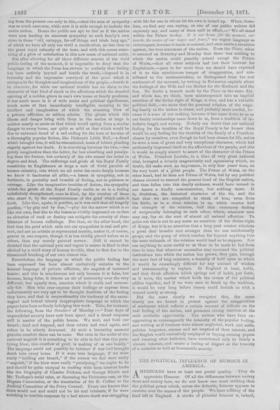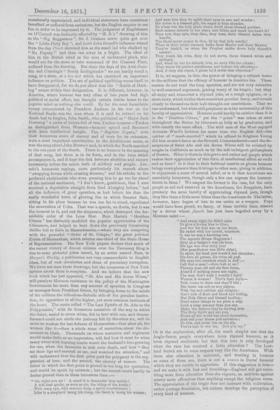THE POLITICAL INFLUENCE OF HUMOUR IN AMERICA.
A MEItICANS have at least one genial quality. They do appreciate Humour. Of all the differences between society there and society here, wo do not know one more striking than the political power which, across the Atlantic, humour appears to exercise over time masses of the people. We have nothing of the kind left in England. A stroke of pictorial humour is, indeed, occasionally appreciated, and individual statesmen have sometimes benefited or suffered from caricature, but the English require to see fun in order to be impressed by it. The judgment of Englishmen on O'Connell was distinctly affected by " H. B.'s " drawing of him as the "Big Beggarman "; Sir J. Graham never quite got over the "Little Dirty Boy "; and Lord John Russell's influence waned from the day Punch sketched him as the small lad who chalked up "No Popery 1" and then ran away in a fright. The ideal of him in the British mind as the man of undaunted pluck, who would cut for the stone or take command of the Channel Fleet, suffered from the drawing. But since the days of the Anti-Jaco- bin and Canning's "Needy Knifegriuder " we can hardly recall a song, or a story, or a ban mot which has exercised an important influence on politics. The art of political squibbing seems itself to have disappeared, for we do not allow that the " Battle of Dork- ing" conies within that designation. It is different, however, in America, where humour has very often of late years had high political or social effect, has brought certain truths home to the popular mind as nothing else could. By far the most formidable enemy encountered by President Jackson in his war on the National Banks was the man whom it is said he refused on his death. bed to forgive, Seba Smith, who published as " Major Jack Downing" a series of letters full of true Yankee humour—Yankee as distinguished from Western—humour spiced and flavoured with keen intellectual insight. The " Bigelow Papers," with their humorous scorn of slavery and of wars for its extension, were a most important contribution to the Abolitionist cause, as was the song about John Brown's soul, to which the North marched to the conquest of the South. There is no humour in the meaning of that song, but there is in its form, and in the tune which accompanies it, and it kept the lick between abolition and victory incessantly before the minds both of soldiery and people. Lin- coln's humorous sayings, more particularly his remark about "swapping horses while crossing streams," and his rebuke to the perfervid abolitionists who were pressing him to go too far ahead of the national sentiment, "I don't know, gentlemen, that I ever received a deputation straight from God Almighty before," had all the influence of groat speeches, as had before his time the really wonderful burst of glowing fun in which Senator Hale, sitting in his place because ho was too fat to stand, repudiated the annexation of Cuba. That was a speech, no doubt, but it was the humour in it, and not the eloquence, which destroyed the for- midable order of the Lone Star. Bret Harte's " Heathen Chinee" has distinctly modified the popular appreciation of the Chinamen, and helped to beat down the previously threatening dislike felt to them in Massachusetts,—where they are competing with the powerful " Order of St. Crispin," the great political Union of Shoemakers, which returns one-third of the State House
• of Representatives. The New York papers declare that much of
the recent victory of decent citizens over the Tammany Ring is due to some pictorial jokes issued, by an artist named Nast, in Harper'R Weekly, a publication not very commendable to English ideas, but of vast circulation and clean of pecuniary corruption. We have not seen these drawings, but the consensus of New York opinion about them is complete. And we believe that the new book which has just appeared, " St, Abe and His Seven 'Wives," will paralyze Mormon resistauco to the policy of the Washington Government far more than any amount of speeches in Congress or messages from President Grant, by bringing home to the minds of the millions the ridiculous-diabolic side of the peculiar institu- tion, its opposition to all the higher, yet more common instincts of the heart. The canto called "The Last Epistle of St. Abe to the Polygamists," with its humorous narrative of the way in which the Saint, sealed to seven wives, fell in love with ono, and thence- forward could not abide the jealousy felt by the other six, will do mere to weaken the last defence of Mormonism—that after all, the women like it—than a whole ream of narratives about the dis- content in Utah. Thousands on whom narrative and argument would make little or no impression, will feel how it must be when many wives with burning hearts watch the husband's love growing for one, when the favourite is sick unto death, and how " they set their lips and sneered at me, and watched the situation," and will understand that the first price paid for polygamy is the sup pression of love, and the second, the slavery of women, The letter in which the -first point is proved is too long for quotation, and would be spoilt by extracts ; but the second could hardly be better proved than in these humorous lines ;- "Ali, right you air 1 A creed it is dowandin' iron mottle
A will that quells, as soon as riz, the biling of the kettle I
With wary eye, with manner deep, a spirit overbrimtniu ", Like to a shepherd 'Inong his sheep, the Saint is 'mong his women
And unto him they do uplift their eyes in awe and wonder ; His notice is a blessed gift, his anger is blue thunder.
No n'ises vex the holy pleas where dwell those blessed parties; Each miesus shinoth in her place, and blithe and meek her heart is I They sow, they spin, they darn, they hem, their blessed babes they handle,
The Devil never comes to them, lit by that holy candle!
When in their midst serenely walks their Master and their Mentor,
They're hush'd, us when the Prophet stalks down holy church's
centre
They touch his robe, they do not move, those blessed wives and
mothers, And, when on one he shinoth love, no envy fills the others ;
They know his perfect saintliness, and honour his affection— And, if they did object, I gnoss he'd settle that objection I" It is, we suppose, in this, the power of bringing a subject home to the millions that the efficacy of humour in America lies. These masses do not read the long speeches, and are not very attentive to well-reasoned argument, getting weary of its length ; but they all enjoy and remember a rhymed joke, or a rough epigram, or a short story, which tickles their somewhat peculiar fancy, and reveals clearly to themselves their half-thought-out convictions, That we can understand, but what still perplexes us is the universality of this faculty of appreciation. Humour could hardly be subtler than it is in the " Heathen Chinee," yet the " point " was taken' at once throughout the States by labourers as fully as by graduates, and with exactly the same effect, The wild men of the West enjoyed At-towns Ward's lectures far more than the English did—the epithet of " much-married " which he affixed to Brigham Young did him as much harm as the Seventh Commandment—and the de- scriptions of Saint Abe and his Seven Wives will be relished by roughs in California as much as by the self-indulgent philosophers of Boston. What is there in this grave and rather sad people which makes their appreciation of this form of intellectual effort so swift and so keen ? Is it that to their habitual reserve or gloom humour brings more pleasure than it brings to other men, giving in addition to enjoyment a sense of mental relief, or is it that Americans are essentially humorous, though only a few can express the humour latent in them ? We suspect the former is the case, for the only people as sad and reserved as the Americans, the Bengalees, have precisely the same faculty- of appreciating rhymed jests, though they like them a little more bitter than theAmericans do. The latter, however, have begun of late to use satire as a weapon. Pope would have been proud, we fancy, of these terrible lines, uttered by a driver whose jiancje has just been beguiled away by a Mormon saint :-- " And every night be didn't miss To give a loving kiss to Oise;
And the" his fest was on her brow, He ended with her mouth, somehow.
0, but he was a knowing one, The Apostle Hiram Higginson Grey as a badger's was his hoer,
His ago was over sixty year (Her grandfather was little older), So short, his head just touch'd her shoulder ;
His face all grease, his voice all puff, His eyes two currants stuck in duff ;— Call that a man !—then look at me!
Thretty year old and six foot three, Afoar'd o' nothing morn nor night, The man don't walk I wouldn't fight!
Women is women! That's their style— Talk reason to them and they'll bile ; But baste 'em soft as any pigeon,
With lies and rubbish and religion; Don't talk of flesh and blood and feeling, But Holy Ghost and blessed healing; Don't name things in too plain a way, Look a heap warmer than you say, Make 'em believe they're serving true The Holy Spirit and not you, Prove all the world but you's damnation, And call your kisses jest salvation ; Do this, and press 'sin on the sly,
You're Bide to win 'em. Jost you try I" Or is the explanation, after all, the much simpler one that the Anglo-Saxon people everywhere loves rhymed humour, as it loves rhymed sentiment, but that this love is only developed when the race has received a little education ? The Low- land Scotch are in some respects very like the Americans. With them also education is universal, and wanting in humour as some of them are, there is not a nuance in Burns' humour which they are unable to appreciate. If this suggestion is true— and we make it with fear and trembling—England will get some- thing more from education than she expects, an antidote against misery more efficacious than anything except the religious sense. The appreciation of the tragic does not increase with cultivation, rather perhaps diminishes, but culture develops the perception of every kind of humour.











































 Previous page
Previous page